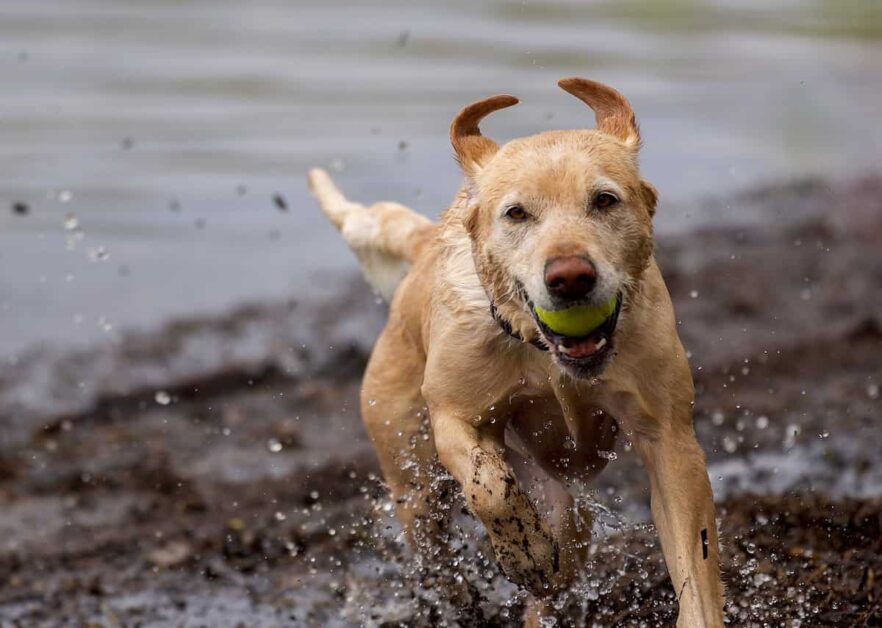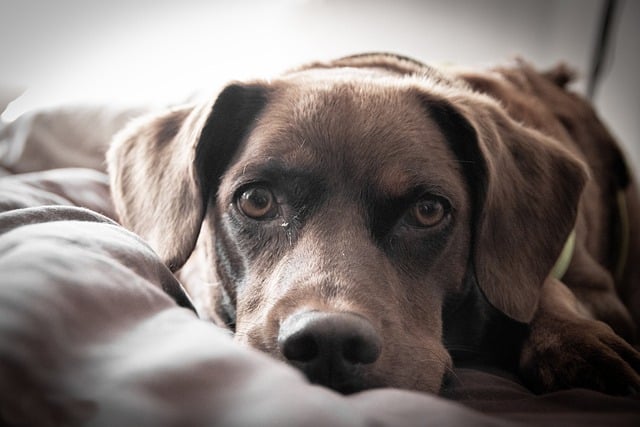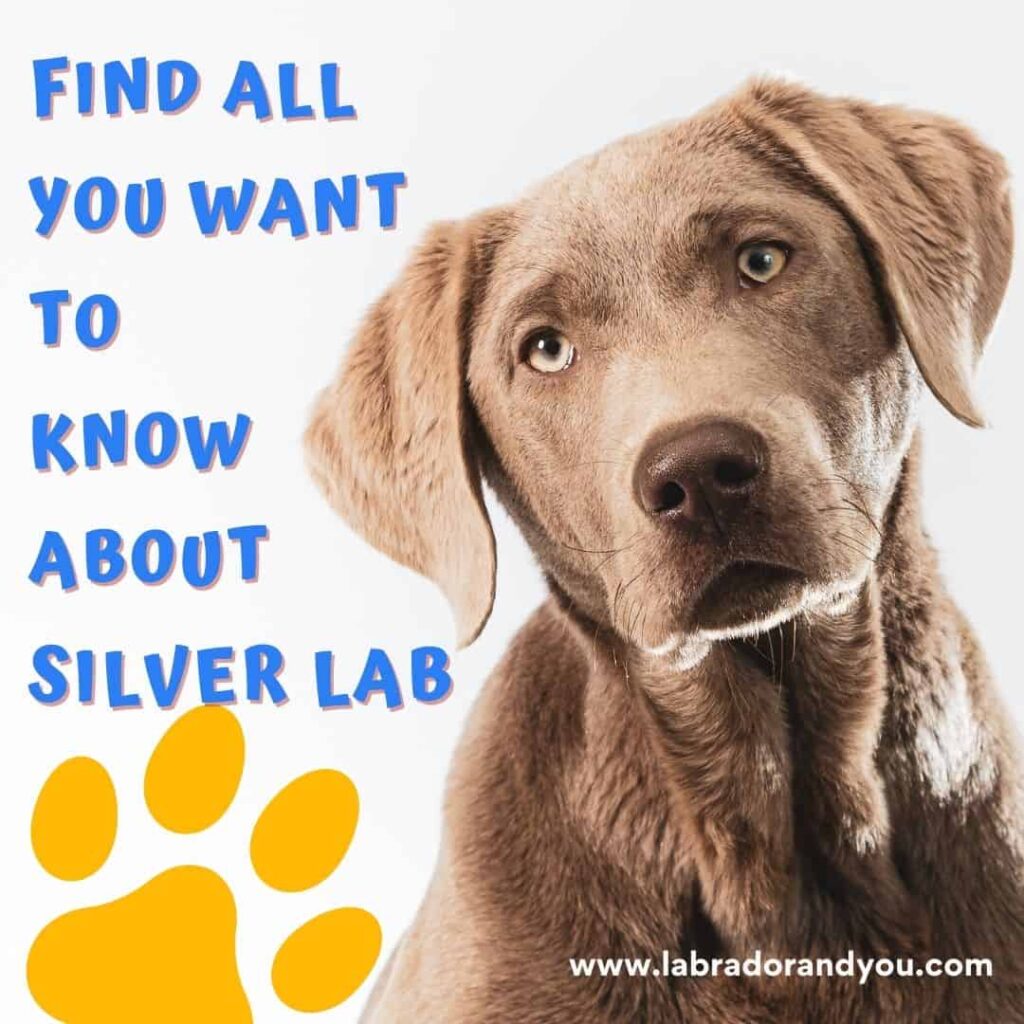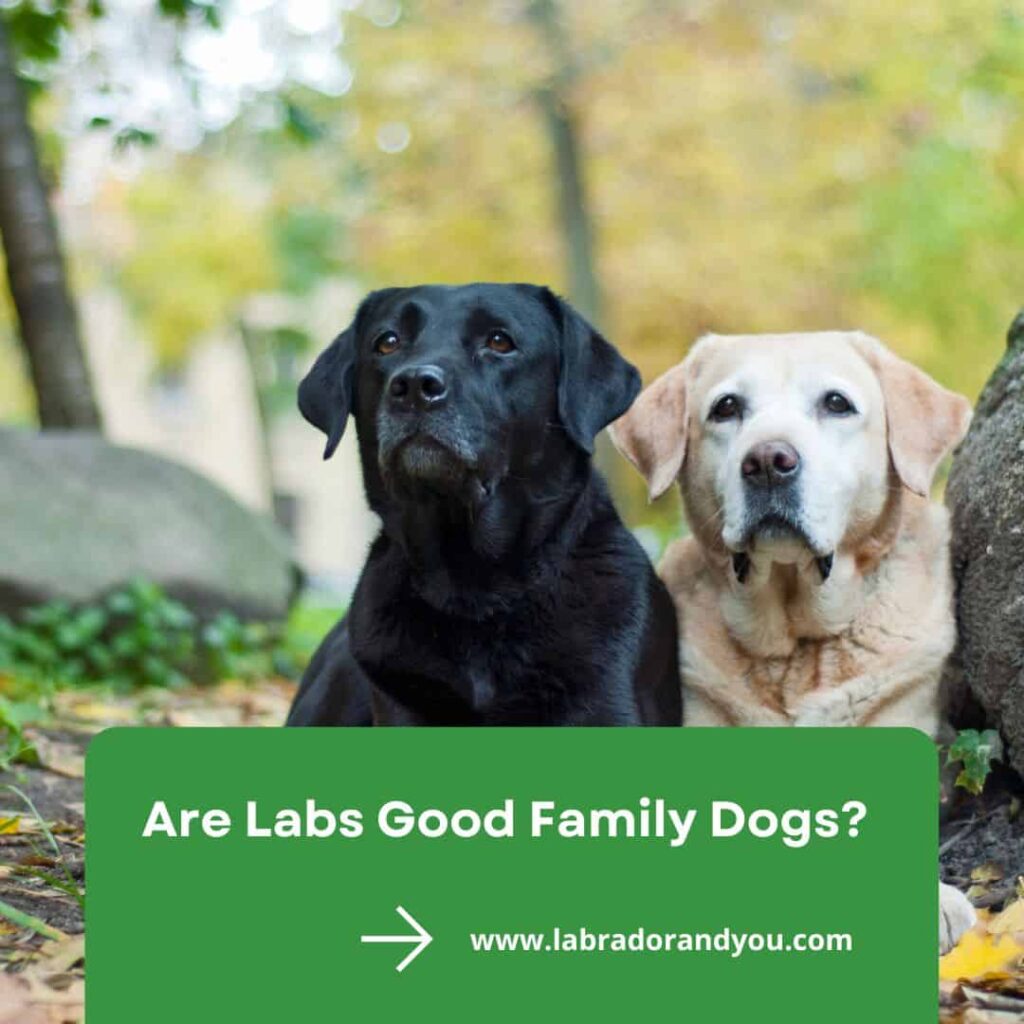Do you struggle with a hyperactive puppy who won’t calm down? Don’t worry; you’re not alone! Puppies have abundant energy, and our puppy parents’ job is to help them manage it. So, how do you calm a puppy down?
Puppies have a lot of energy and can easily get overexcited. When your puppy is hyper, remain calm and use a gentle, soothing voice. Try distracting them with a toy or treat to redirect their energy. Take them for a walk, which can help release pent-up energy.
Why Do Puppies Have So Much Energy?
Puppies are notorious for their boundless energy, which can be attributed to various factors. The table below highlights some reasons why puppies have so much energy.
| Factor | Description |
|---|---|
| Growth and Development | Puppies are growing and developing rapidly, which requires a lot of energy. Their bodies are constantly working to build muscles, bones, and tissues. |
| Curiosity and Exploration | As puppies discover the world around them, their natural curiosity and desire to explore drive them to be more active and energetic. |
| Learning | Puppies are eager to learn and acquire new skills, often involving engaging in various activities demanding high energy levels. |
| Playfulness | Playtime is essential for puppies as it helps them develop skills, socialize, and bond with their owners. This makes them more energetic during their play sessions. |
| Breed Characteristics | Some breeds are naturally more energetic than others, like working and herding breeds bred for high-energy tasks. |
| Attention Seeking | Puppies may display energetic behavior to seek attention from their owners, especially if they feel they are not getting enough of it. |
5 Signs To Tell Whether Your Puppy Is Hyperactive
If your puppy is restless, barking aimlessly, more clingy than other dogs, often gets into trouble and has a shorter attention span, then they might be hyperactive – read on to learn how to manage their energy.
They Are Restless
One of the telltale signs that your puppy is hyperactive is restlessness. Restless puppies may constantly be on the move, unable to sit still or settle down for more than a few moments.
They might pace back and forth in their space, whine or paw incessantly at objects around them, or even try chewing on furniture or other household items out of sheer boredom.
For example, consider a Golden Retriever pup named Daisy who would consistently opt to roam around aimlessly instead of settling down for some downtime after an extended play session.
In this case, Daisy’s owner must address the underlying issue by engaging her in mental stimulation exercises like puzzle toys and scent-based games.
Ensuring Daisy has good chew toys available will also help deter destructive tendencies caused by restlessness.

They Bark Aimlessly
One common sign of a hyperactive puppy is aimless barking, where they are constantly making noise without any apparent reason or purpose. This behavior may result from lots of energy your pup doesn’t know how to release; hence, they resort to expressing themselves nonstop barking.
To help manage this issue, it’s essential first to identify any triggers that might lead to such excited behavior and teach them alternative ways to cope when those triggers occur.
For instance, if your puppy starts barking due to boredom or lack of mental stimulation, providing interactive toys and engaging in calming games like tug-of-war can redirect their puppy energy into more positive outlets.
Furthermore, rewarding calm behavior will reinforce the desired response and encourage relaxation over time.
They Are More Clingy Than Other Dogs
If your puppy, just a few months of age, is constantly following you and seems unable to leave your side, they may display clingy behavior. While all puppies can exhibit clinginess, hyperactive pups tend to take it to the extreme.
To manage this excessive attachment, try gradually increasing the time your puppy spends away from you each day. Encourage them to play with toys or engage in activities that do not involve your constant attention.
When your pup acts calm and relaxed while alone, reward them with treats or praise to reinforce good behavior.
They Often Get Into Trouble
Puppies with high energy levels can often get into trouble due to their need for constant stimulation and play. They may chew on furniture, dig holes in the backyard, or get into things they shouldn’t be getting into.
As an owner, it’s important to provide your pup with ample opportunities for exercise and playtime to prevent them from getting bored and destructive. Additionally, as pet parents, you can redirect your puppy’s energy towards more suitable activities, such as playing fetch or tug-of-war, and provide interactive toys that require problem-solving skills.
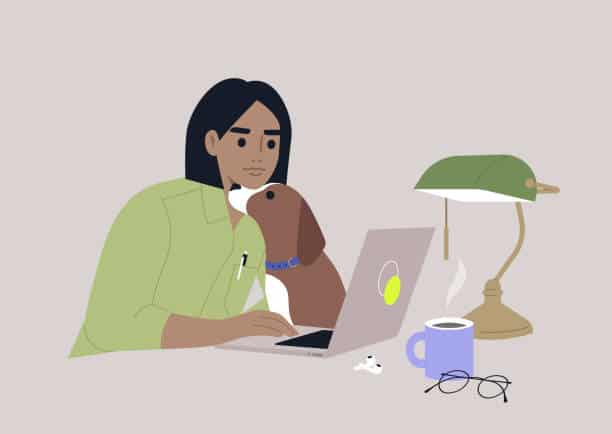
They Have Shorter Attention Span
Puppies have shorter attention spans than adult dogs, often leading to hyperactive behavior. They tend to get easily distracted and lose focus quickly.
This makes training sessions challenging and requires patience on the part of dog owners. One way to manage this is by keeping training sessions short and frequent rather than long and infrequent.
Consistency is also key; try to use the same cues repeatedly so your puppy can learn them more easily. Providing mental stimulation through toys or puzzles can also help keep their attention focused for longer periods of time.
How To Manage Your Pup’s Unwanted Behaviors?
Learn how to drain your puppy’s energy, provide appropriate outlets, and engage their senses with relaxing scents.
Don’t Encourage Their Over-excitement
It’s important not to encourage over-excitement in your hyperactive puppy. This means avoiding activities triggering their energy levels or making them more anxious, such as loud noises or excessive playtime.
Instead, offer calm and quiet activities like puzzle toys or chew bones to redirect their energy. Also, avoid constantly petting or playing with your puppy when they are overly excited, as this reinforces the behavior.
Instead, reward them for calm and relaxed behavior by offering treats or praise when they settle down independently.
Drain Your Puppy’s Pent-up Energy
One effective approach to managing your puppy’s hyperactivity is by draining their energy. You can do this in various ways, including going on walks or runs with your pup, playing fetch or other interactive games that require movement, and taking them to explore new environments.
You can also try practicing obedience training as it engages your puppy both mentally and physically, helping them release any built-up energy. Remember that overstimulating your puppy can increase excitement rather than relaxation, so find a balance between exercise and calmness.
Provide Them An Outlet But With Limitations
Giving your hyperactive puppy an outlet to release their energy is important, but it should be done with limitations. This means setting boundaries and being consistent with them.
For example, if playing fetch in the backyard is something your pup enjoys, limit it to a certain amount of time each day and rotate in other activities like puzzle toys or scent games.
Another way to provide an outlet for your puppy is through supervised socialization with other dogs. However, ensure that the playtime environment is controlled so it doesn’t become too overwhelming for either dog.
Remember that providing an outlet alone isn’t enough – you also need to train and reinforce calm behaviors so your puppy learns when they can let loose and when they should relax.
Engage Their Nose With Relaxing Scents
Using calming scents can help calm down a hyperactive puppy. Dogs have a keen sense of smell, so providing them with aromatherapy can help induce relaxation and reduce anxiety.
Scents like lavender, chamomile, and vanilla are soothing for dogs. You can use essential oils or candles in the room where your pup spends most of their time, or even add some drops of essential oil onto a bandana tied around their neck.
However, ensure the scent is not overpowering, as it could irritate your furry friend’s nose.
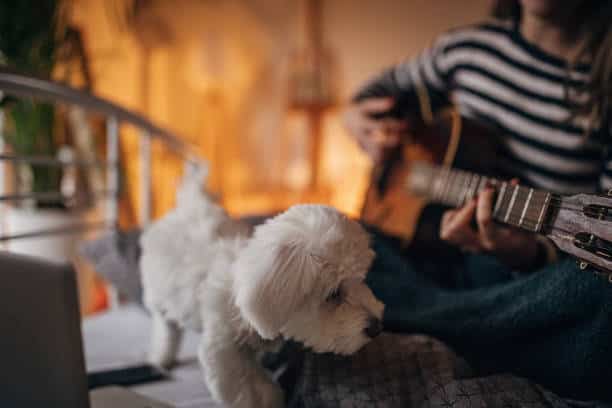
Encourage A Calm Behavior With Rewards Or Treats
One effective way to encourage your puppy to remain calm is by rewarding them with treats when they exhibit calm behavior.
For instance, if your pup stays quiet and still while you’re watching TV or working from home, consider giving them a tasty treat or toy as a reward.
Another idea is to create a “calming routine” before bedtime, or when you know your pup tends to get hyperactive. You can give them a specific chew bone or toy only during this time so that they associate it with relaxation and calming down.
Giving An Appropriate Outlet For Your Puppy’s Natural Drive
Remember that puppies have a natural drive to explore and play; giving them an outlet for these behaviors is important. This can be achieved through interactive toys such as puzzle feeders, rope toys or balls. Playing fetch in the backyard is also a great way to get their energy out while bonding with your pup.
Regular walks and visits to the dog park can help satisfy your puppy’s need for exercise and socialization.
Keeping your puppy mentally stimulated will help keep them calm and prevent destructive behavior caused by boredom or excess energy. When providing an outlet for your puppy’s natural drive, ensure they are supervised at all times for safety reasons and avoid over-stimulating them, as this may lead to further hyperactivity rather than relaxation.
Exercise, Don’t Over-stimulate
Regular exercise is an excellent way to expand your puppy’s excess energy and calm them. However, never over-stimulate them with too much exercise.
Over-exercising a hyperactive puppy can lead to even more restlessness and anxiety. For example, instead of taking your puppy on an hour-long walk in the morning, try two 30-minute walks spread throughout the day. This approach will help manage their energy levels while allowing them to get outside and explore their surroundings.
Remember, every puppy has unique exercise needs, so pay attention to how they respond and adjust accordingly.
16 Step By Step Guide To Calm Your Puppy Down
Learn effective techniques to calm down your hyperactive puppy with these 16 helpful methods. From mental exercise and teaching a “settle” command to play calming music and using hemp oil, there are plenty of options to help your furry friend relax.
Mental Exercise
In addition to physical exercise, mental stimulation is crucial for hyper puppies. Mental exercises can help your puppy feel more relaxed and less anxious.
You can try teaching them new tricks or playing games that require problem-solving skills. For example, hiding treats around the house and encouraging your pup to find them using their sense of smell is a great way to stimulate their mind.
These activities offer a chance for your furry friend’s brainpower and intellect development, and it also helps burn off extra energy, allowing them to stay calm at other times throughout the day.
Taking Breaks
Taking breaks is an essential part of managing a hyperactive puppy. Just like humans, dogs need time to rest and recharge. Experts recommend giving your pup frequent breaks throughout the day when they become overstimulated or restless.
Taking a brief pause from playtime or training sessions can help prevent burnout and keep your puppy’s energy levels in check. During these breaks, you can offer your dog calming activities such as chewing on a toy or practicing relaxation exercises like deep breathing.
Taking short walks around the block can also benefit you and your furry friend.
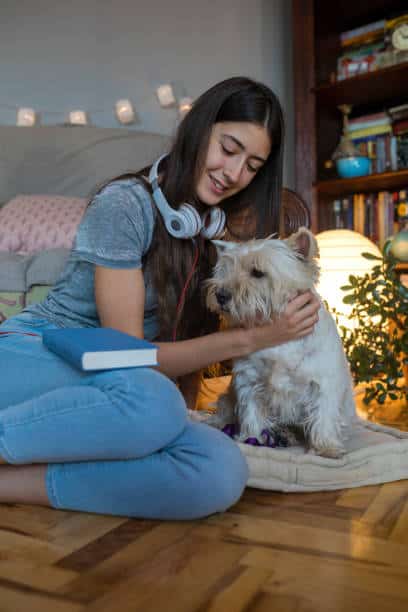
Teach A “Settle” Command
Teaching your puppy the “settle” command is an effective way to calm them down. This command instructs your puppy to relax and settle in one spot for a period of time.
Start by choosing a specific location where you want your puppy to settle, such as their bed or a designated mat. Use positive reinforcement techniques like treats or praise when they obey this command.
Another helpful tip is to use calming scents, like lavender or chamomile, during training sessions, which can help soothe your hyperactive pup. Using the “settle” command and other techniques mentioned in our outline above, you can create a peaceful environment for you and your furry friend.
Give Them A Space Where They Can Be Completely Relaxed
Providing your hyperactive pup with a designated space to relax and unwind completely is important. This could be a cozy crate or a comfortable bed in a quiet corner.
Allow them access to this area whenever they want to take time out of their energetic activities. Providing your puppy with this safe, calming haven will help reduce their anxiety levels and promote better sleep quality, leading to improved behavior during waking hours.
You can also make this space more inviting by adding soft blankets, toys, and treats for comfort and relaxation.
Allow Your Puppy To Sleep Near You, If Possible
Allowing your puppy to sleep near you can be a great way to calm them down. Dogs are social creatures and crave the comfort of their pack (that’s you!). Sleeping near you can help ease any anxiety your pup may have, especially if they’re still adjusting to their new surroundings.
However, remember that this is not a solution for all puppies. Some may prefer their own space or feel more comfortable sleeping on their own bed. Gauge your puppy’s behavior and preferences before deciding.
If your puppy seems restless or anxious when trying to sleep alone, allowing them to cuddle up with you could be just what they need for a peaceful night’s rest.
Engage In Calming Interactions For An Hour Before Bed
Calming interactions with your puppy is an effective way to help them wind down before bedtime. Spending quality time with your pup can also create a positive association with relaxation and promote bonding between you and your furry friend.
Simple activities like gently petting or massaging your dog, reading a book out loud near them, or lying beside them for some cuddles can all be great options. Playing soothing music or providing aromatherapy scents like lavender oil can help calm their nerves and promote better sleep.
Stop Playing Or Doing Anything That Makes Your Dog More Excited
Games with your puppy can increase their excitement levels and make it harder for them to calm down. Avoid games like roughhousing or chasing that may cause overexcitement when playing with your pup.
Instead, opt for more calming games such as tug-of-war or hiding treats for them to find. If you notice your pup getting overly excited during playtime, take a break and redirect their attention to something else, like training exercises or chewing on a toy.
Do Not Feed Your Dog Right Before Going To Sleep
Never feed your puppy right before bedtime. Feeding them close to bedtime can cause digestion issues and discomfort, leading to restlessness and hyperactivity during the night.
Instead, try feeding them earlier in the evening and giving them ample time to digest before sleeping. This will allow your puppy’s body enough time to process the food they have eaten and settle into a peaceful slumber without any disturbances.
Providing love and affection through cuddles or massages can also help calm an overly-excited puppy before bed.
Pet Or Massage Your Dog To Relax Them
One way to help calm a hyperactive puppy is through gentle petting or massaging. This can help soothe their nerves and reduce stress levels.
When giving your pup a massage, start with slow, gentle strokes on their back and neck, then move on to the legs and paws.
Rewarding your pup’s relaxed behavior during these moments of relaxation is important to reinforce that being calm leads to positive outcomes. Providing them with enough attention and love throughout the day can also significantly calm them down when they get too excited or anxious.
Play Tranquil Music To Set The Right Tone
Music can have a powerful impact on a puppy’s mood and behavior. Playing calming, relaxing music can help to set the right tone for your puppy and promote relaxation.
Studies have shown that playing classical music or nature sounds can decrease heart rates in dogs, reducing anxiety levels and promoting overall calmness.
You can experiment with different types of music to see what works best for your pet. Some puppies prefer soft instrumental tunes, while others respond better to lullabies or even white noise.
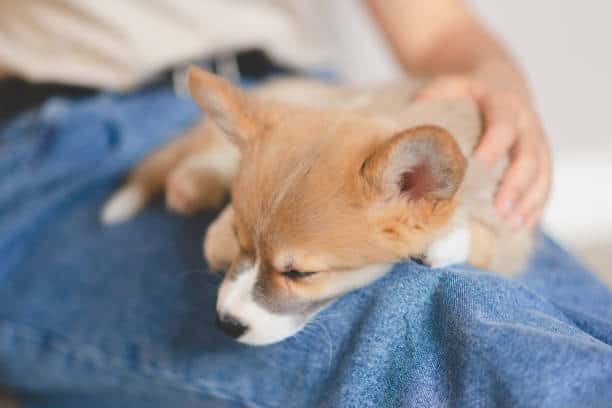
Take Them On Walks That Are Exciting, But Not Too Stimulating
Taking your puppy on walks is crucial for their physical and mental well-being. However, the walks must not too stimulating, as this can lead to hyperactivity and naughty behavior later on.
Instead, opt for walks that are exciting but not overwhelming.
During the walk, reinforce positive behaviors like walking calmly on a leash and ignoring distractions. If your puppy becomes too excited or overwhelmed during the walk, stop and let them calm down before continuing.
By taking these steps and providing appropriate stimulation on walks, you’ll help your puppy burn off some excess energy while keeping them mentally stimulated and happy.
Play Some Of Your Puppy’s Favorite Games
Playing games with your puppy can be an effective way to calm them down. By redirecting their energy towards something they enjoy, you can help your pup focus and release excess energy in a positive way.
Some popular games that may help calm puppies include tug-of-war, fetch or hide-and-seek. Encourage your puppy to play these games but avoid overly stimulating activities like wrestling or roughhousing.
Remember to reinforce desired behaviors during the game and provide plenty of time for quiet rest and relaxation afterward.
Take Your Puppy Out To Use The Bathroom Right Before Bed
Taking your puppy out to use the bathroom right before bed is essential to calming them down for a good night’s sleep. If your pup has any energy built up from holding their bladder, it could lead to restless behavior and difficulty settling in.
Not only does this habit promote better sleeping patterns, but it also helps in-house training by preventing accidents during the night. Additionally, taking your puppy out before bedtime allows you to spend some relaxing time together and can create a stronger bond between you two.
Have A Consistent Daytime And Nighttime Routine
Establishing a consistent daytime and nighttime routine for your puppy can help them feel more secure, reduce anxiety, and calm them down. This means establishing regular times for feeding, playtime, training sessions, walks, and bedtime.
For example, if you usually take your puppy for a walk before dinner every day, followed by some quiet time in the Revol dog crate while eating dinner, stick to that consistently.
Also, try not to deviate too much on weekends or holidays as it could confuse your puppy, who has been used to their established routine during weekdays.
Using Hemp Oil For Nervous Puppies
Hemp oil is a natural supplement that can help alleviate anxiety and stress in puppies. It contains compounds that interact with the endocannabinoid system in your puppy’s body, which can have a calming effect on their nervous system.
You can give your pup hemp oil orally or add it to their food. However, don’t forget to talk to your veterinarian before giving any supplements to your puppy, especially if they are on medication or have underlying health issues.
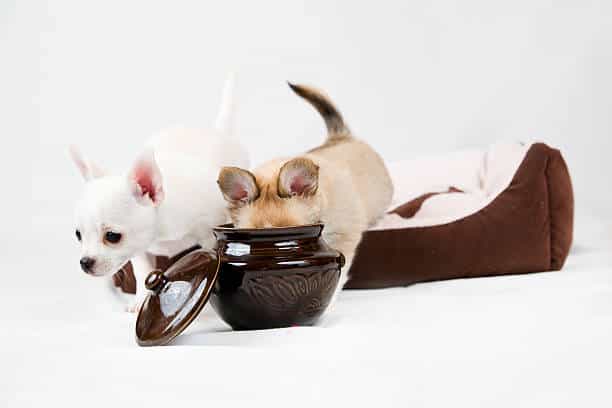
FAQ
At what age do dogs calm down?
The age at which dogs calm down varies depending on the breed. Smaller breeds tend to calm down earlier than larger breeds. In general, most dogs will start to calm down around 2 or 3 years old. However, some dogs may never completely calm down, which is perfectly normal.
How do I train my dog to be quiet?
You can do a few things to train your dog to be quiet. One is to ignore them when they are barking or whining. This may seem counterintuitive, but it is important not to give them any attention when they are being noisy. If you do, they will learn that barking or whining is a way to get your attention.
Another thing you can do is to teach your dog a command that means “be quiet.” This could be something like “quiet,” “settle,” or “hush.” Once your dog knows the command, you can use it when they bark or whine.
At what age do dogs exhibit bad behaviors?
Dogs can start to misbehave at any age. However, the most common age for misbehavior is between 2 and 3 years old. This is because puppies are still learning how to behave, and they may start to test the limits of their owners. Some common forms of misbehavior include:
- Barking or whining
- Chewing on furniture or other objects
- Jumping up on people
- Pulling on the leash
- Digging in the yard
How to calm a puppy with separation anxiety?
Puppies with separation anxiety can become very distressed when left alone. Try leaving your puppy alone for short periods to get them used to it. Give them a long-lasting chew toy for distraction and leave calmly without fanfare. Consider using calming aids like pheromone diffusers or calming music.
Crate training with positive reinforcement creates a safe space for your puppy. Reward calm behavior when you return. Never punish anxiety behavior. Be patient, as this takes time.
With incremental alone time and consistency, your puppy will gain confidence and learn to self-soothe when you are gone. Training and maturity will help ease their anxiety.
Author Profile
- Site Owner And Dog Lover
-
Aritra, the founder of Labradorandyou.com, is a lifelong dog lover whose passion ignited for Labradors for their loyalty and intelligence. With extensive research and personal experiences, Aritra has become a Labrador expert, offering a rich resource on the breed. Labradorandyou.com provides reliable, timely, and evidence-based information, including Labrador-specific product reviews, training techniques, and care tips.
Labradorandyou.com was born out of Aritra's passion and his desire to share his profound knowledge about the breed. The site serves as a comprehensive resource, offering a wealth of up-to-date information for Labrador owners and enthusiasts alike
Also by the author
-
 Lab-TypesNovember 17, 2023Old Dog Seizures: Causes, Symptoms, and Treatment Options
Lab-TypesNovember 17, 2023Old Dog Seizures: Causes, Symptoms, and Treatment Options
-
 Lab-TypesNovember 17, 2023Why Is My Dogs Poop Yellow? 8 Reasons & Solutions
Lab-TypesNovember 17, 2023Why Is My Dogs Poop Yellow? 8 Reasons & Solutions
-
 ReviewsNovember 17, 2023The Only Hill’s Science Diet Review You Need To Read
ReviewsNovember 17, 2023The Only Hill’s Science Diet Review You Need To Read
-
 Lab-TypesNovember 17, 2023How To Adopt An Emotional Support Dog?
Lab-TypesNovember 17, 2023How To Adopt An Emotional Support Dog?
